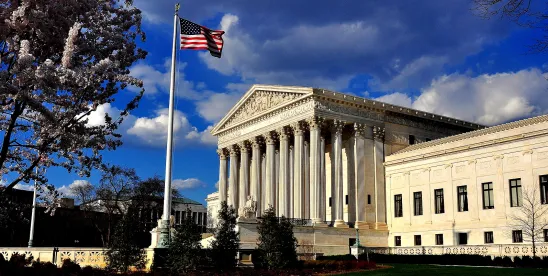On April 29, 2025, the Supreme Court heard argument on an issue that has divided the circuits: “Whether a federal court may certify a class action pursuant to Federal Rule of Civil Procedure 23(b)(3) when some members of the proposed class lack any Article III injury?” The case is Laboratory Corporation of America Holdings, dba Labcorp v. Luke Davis, et al., Case No. 22-55873, and the court’s decision could have a significant impact on class action litigation across the country. But the justices’ questions at oral argument highlighted a procedural wrinkle that could prevent the court from resolving this hotly contested issue.
The named plaintiffs in LabCorp are legally blind individuals who allege that they are unable to use the self-service check-in kiosks installed at LabCorp’s patient service centers. Based on these allegations, the plaintiffs assert claims for damages under the Americans with Disabilities Act and California’s Unruh Act.
In May 2022, the district court certified a damages class under Rule 23(b)(3) comprising all legally blind individuals in California who visited a LabCorp patient service center and “were denied full and equal enjoyment of the goods, services, facilities, privileges, advantages, or accommodations due to LabCorp’s failure to make its e-check-in kiosks accessible to legally blind individuals.” In August 2022, following a motion by plaintiffs to modify the class definition to eliminate any “fail safe” language (generally, a class defined in a way that depends on determination on the merits), the district court issued an order redefining the damages class as all legally blind individuals who visited a LabCorp patient service center “but were unable to use the LabCorp Express Self-Service kiosk.”
LabCorp filed an interlocutory appeal from the district court’s May 2022 order, challenging certification on the ground that the class included members who lacked Article III standing. LabCorp argued that some legally blind individuals who visited a LabCorp patient service center preferred not to use a self-service kiosk. According to LabCorp, those individuals did not suffer any injury but would nonetheless be included in the class.
The Ninth Circuit affirmed the district court’s order. Citing its decision Olean Wholesale Grocery Cooperative, Inc. v. Bumble Bee Foods LLC, 31 F.4th 651 (9th Cir. 2022), the Ninth Circuit explained that “LabCorp’s allegation that some potential class members may not have been injured does not defeat commonality at this time.” Davis v. Lab’y Corp. of Am. Holdings, No. 22-55873, slip op. at 5 n.1 (9th Cir. Feb. 8, 2024).
In its briefing in the Supreme Court, LabCorp framed the issue principally in terms of whether Article III of the Constitution forbids certification of a class that includes uninjured members. Alternatively, it argued that individualized issues will necessarily predominate over any common issues when a class contains an appreciable number of uninjured members, making certification improper under Rule 23(b)(3).
But at oral argument, the justices expressed concern about the fact that LabCorp only filed an appeal from the district court’s May 2022 certification order — not its subsequent August 2022 order that redefined the class to remove any “fail safe” language. That procedural quirk creates two potential problems for LabCorp and for the Supreme Court as it attempts to resolve this case. First, as plaintiffs’ counsel emphasized during oral argument, LabCorp’s arguments regarding uninjured class members appear to be directed primarily at the revised class definition in the August 2022 order, not the original class definition in the May 2022 order that was the subject of LabCorp’s appeal. Second, to the extent LabCorp is challenging the May 2022 order, that order has arguably been rendered a nullity by the district court’s subsequent August 2022 order.
A decision on the merits from the Supreme Court would bring much needed clarity to questions about Article III or predominance under Rule 23(b)(3). Following oral argument, it remains to be seen whether the court will actually reach the merits in this particular case. However, given the fact that the petition for a writ of certiorari was granted in LabCorp, the court clearly has expressed an interest in addressing the underlying issues at some point.
We will provide additional updates here once the Supreme Court acts. In the meantime, parties should pay careful attention to the governing law in their respective circuit, while keeping in mind that the law in this area could soon be clarified.





 />i
/>i
